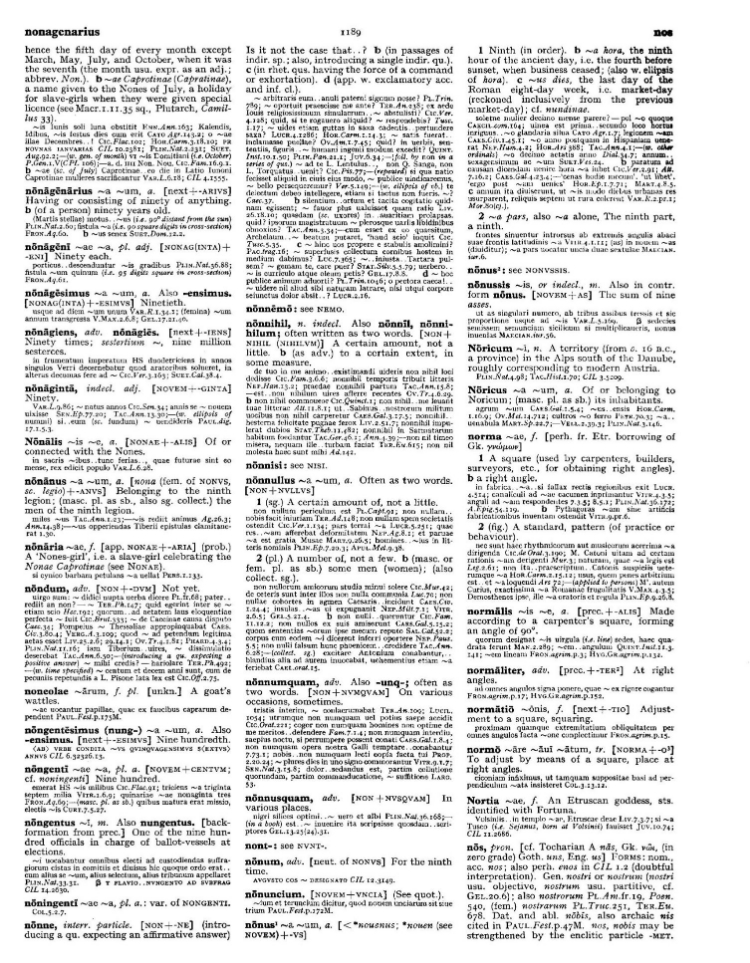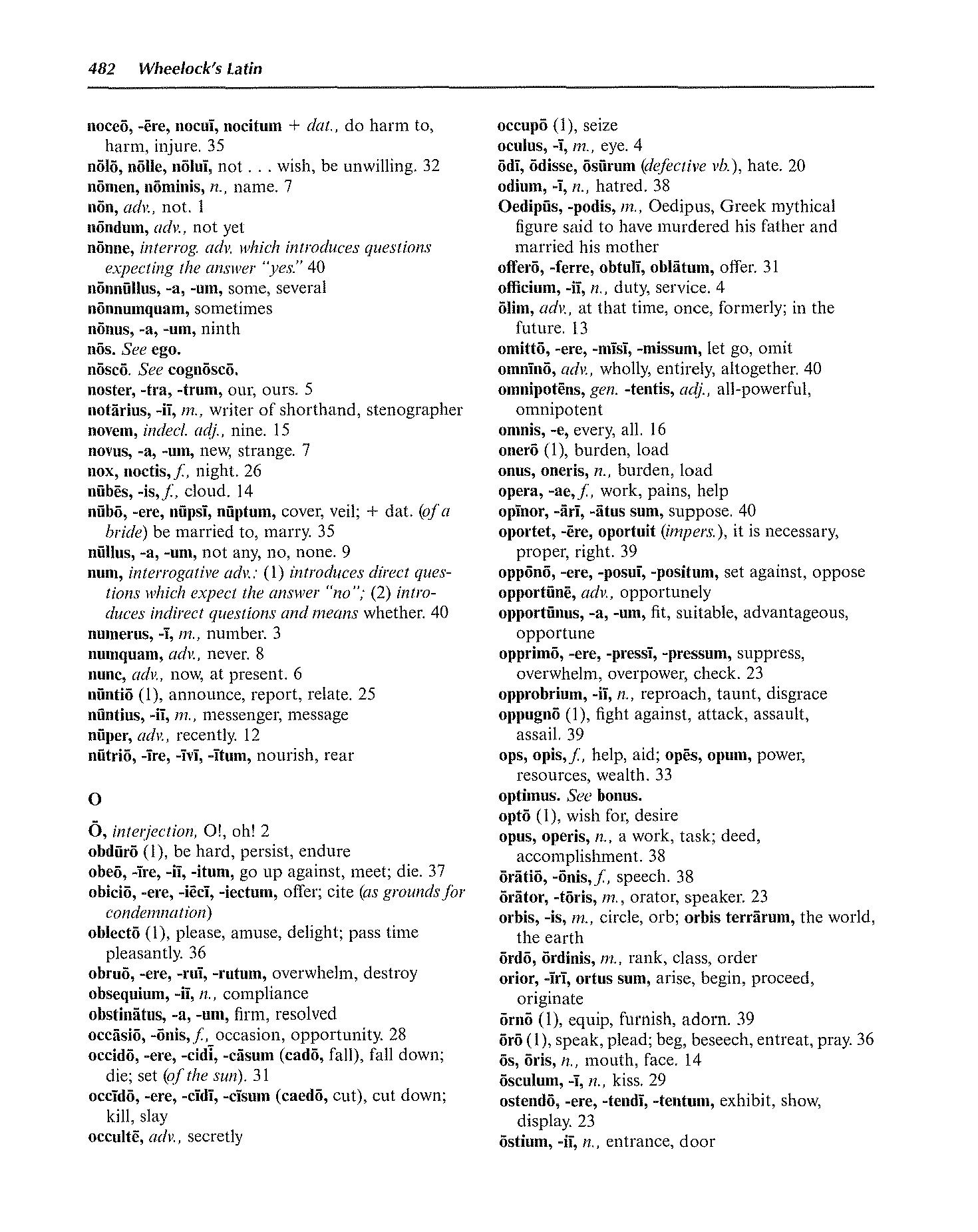
page_listing.tpl
page_subListingDetails.tpl
sub_listingDetails_style1.tpl
sub_listingDetails.title.tpl
nōs We
nōs is a Latin Pronoun that primarily means We.
Definitions for nōs
Wheelock's Latin
Pronoun
- 1
Plural, Nominative of ego
Oxford Latin Dictionary
Pronoun
- 1
We (I and the person or persons specified or implied by the context). (b) (the speaker or writer and his family, household, or entourage). (c) (the speaker or writer and his troops).
- 2
(used indefinitely in generalizing statements, in which the speaker or writer identifies himself with some class of persons to be inferred from the context; esp. with: (b) his countrymen. (c) his contemporaries. (d) his fellow human beings. (e) the living); apud nos, in the upper world.
Sentences with nōs
Latin to English
Nōs laudāvimus nōs.Compare We praised ourselves
Nōs eī ea dabimus.Compare We shall give them (= those things) to him (her).
Nōs servāvimus.Compare We saved ourselves.
Nōs cum cīvibus multārum urbium iungēmus.Compare We shall join ourselves with the citizens of many cities.
Nōs nōn meliōrēs sumus quam plūrimī virī priōrum aetātum.Compare We are not better than very many men of former ages.
Nōs quidem putāmus pecūniam ipsam nōn esse malam; sed crēdimus vēritātem et lībertātem et amīcitiam esse meliōrēs et maiōrēs.Compare We certainly think that money itself is not bad; but we believe that truth and liberty and friendship are better and greater.
Nōs ad urbem īmus; illī domum eunt.Compare We are going to the city; they are going home.
Strenua nos exercet inertia: navibus atque quadrigis petimus bene vivere, quod petis hic est, est Ulubris, animus si te non deficit aequus.Compare We work hard at doing nothing: we seek happiness in yatchs and four-horse coaches. What you seek is here -is at Ulubrae- if an even soul does not fail you.
Data sources
Notes
- Definitions
- Frederick M. Wheelock, Wheelock's Latin, 6th ed., rev. Richard A. LaFleur (New York, NY: HarperCollins Publishers, 2005): 482.
- P. G. W. Glare, Oxford Latin Dictionary, Vols. 1-8 (Oxford: Clarendon Press, 1982): 1189.
- Word frequencies
- Christopher Francese, "Latin Core Vocabulary," Dickinson College Commentaries, last modified 2014, http://dcc.dickinson.edu.
- Paul B. Diederich, The Frequency of Latin Words and Their Endings, PhD diss., (Columbia University, 1939).
- Louis Delatte, Suzanne Govaerts, Joseph Denooz, and Etienne Evrard, Dictionnaire fréquentiel et index inverse de la langue latine [Frequency Dictionary and Inverse Index of the Latin Language] (Liège, Belgium: Laboratoire d'analyse statistique des langues anciennes de l'Université de Liège [L.A.S.L.A.], 1981): 119.
Bibliography
Allen, Joseph H. Allen and Greenough's New Latin Grammar for Schools and Colleges: Founded on Comparative Grammar. Edited by James B. Greenough, George L. Kittredge, Albert A. Howard, and Benjamin L. D'Ooge. Boston, MA: Ginn & Company, 1903.
Crystal, David. A Dictionary of Linguistics and Phonetics. 6th ed. Oxford, UK: Blackwell Publishing, 2008.
Delatte, Louis, Suzanne Govaerts, Joseph Denooz, and Etienne Evrard. Dictionnaire fréquentiel et index inverse de la langue latine [Frequency Dictionary and Inverse Index of the Latin Language]. Liège, Belgium: Laboratoire d'analyse statistique des langues anciennes de l'Université de Liège (L.A.S.L.A.), 1981.
Diederich, Paul B. The Frequency of Latin Words and Their Endings. PhD diss., Columbia University, 1939.
Francese, Christopher. "Latin Core Vocabulary." Dickinson College Commentaries. Last modified 2014. http://dcc.dickinson.edu/latin-vocabulary-list.
Gildersleeve, Basil L., and Gonzales Lodge. Gildersleeve's Latin Grammar: Third Edition, Revised, and Enlarged. 3rd ed. London, England: Macmillan and Co., 1903.
Glare, Peter G.W. Oxford Latin Dictionary. Vols. 1-8. Oxford, England: Clarendon Press, 1982.
Krüger, Bernd. "Latin Conjugation Tables." Cactus2000. Accessed May 5, 2023. https://latin.cactus2000.de/index.en.php.
Pierson, Nick. "Sound of Text." Accessed October 26, 2019. https://soundoftext.com.
Wheelock, Frederick M. Wheelock's Latin. 6th ed. Revised by Richard A. LaFleur. New York, NY: HarperCollins Publishers, 2005.
Wiktionary Contributors. "Victionarium." Wikimedia Foundation, Inc. Updated March 18, 2019. https://la.wiktionary.org/wiki/Victionarium:Pagina_prima.
Citation
Chicago (17th ed.)
Allo Contributors. "nōs (pron.) - Latin Word Definition." Allo Latin Dictionary. Last modified . Accessed February 23, 2026. http://ancientlanguages.org/latin/dictionary/nos.
Entry created on . Last updated on .








